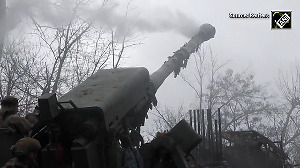The Communist Party of India (Marxist) on Monday justified its support to United Progessive Alliance Presidential poll nominee Pranab Mukherjee, saying abstention would have not only meant "lining up" with Trinamool Congress but also blunted its intervention in the emerging political scenario.
Noting that both ruling UPA and opposition NDA had been "weakened" as manifested in the way they dealt with the presidential poll, party General Secretary Prakash Karat said it was "necessary to utilise the conflicts and fissures within the ruling alliance between the bourgeois parties. Abstention at this juncture will not help in this regard."
Karat's views in an article in the forthcoming issue of party organ 'People's Democracy' came close on the heels of the expulsion of a youth leader, Prasenjit Bose, who had protested CPI(M)'s support to Mukherjee saying it as a "grave error which will harm the party and disturb Left unity."
The article also came in the wake of some Left parties like Communist Party of India, Revolutionary Socialist Party and CPI-ML (Liberation), deciding to abstain from voting in the Presidential poll.
"Abstention in this case would mean lining up with Mamata Banerjee and Trinamool Congress in West Bengal. This would be politically damaging and unacceptable. ... It would (also) blunt the intervention of the party in the developing political scenario," Karat said.
Observing that CPI(M) and other Left parties had been weakened since 2009, he said no illusions should be harboured that "the ruling classes will cease their hostile approach" against the Left, given their "unremitting position" against neo-liberal policies.
Predicting a "renewed push" for neo-liberal reforms that "the big business and international finance capital are clamouring for", he said CPI(M) would like all opposition parties to take a united stand on these issues.
"It would hence be erroneous to confuse the approach towards the selection of a Presidential candidate with the tactics of fighting neo-liberal policies," Karat said.
Observing that the Presidential election should not be seen as "just a contest" between Mukherjee and P A Sangma, he said "beneath the surface are stirrings and a churning process that presage a political realignment."
He said the rift between Trinamool and Congress on the Presidential and other issues should not to be seen in isolation. In West Bengal, TMC was "working to marginalise the Congress and to appropriate its base, and is quite willing to resort to strong-arm methods to accomplish this objective."
As against the Congress and the BJP, regional parties, which are not bound to either of the major parties, have been gaining ground. "They are acting on the basis of their interests, sometimes opportunistically. But the common stand they are taking is to assert the federal principle, which is a positive trend," Karat said.
The CPI(M) leader also took into account the fact that a number of non-UPA parties, including Samajwadi Party, BSP, JD(S) and JD(U), announced support for Mukherjee.
"The CPI(M) would have considered the possibility of another candidate to be supported if there were other secular opposition parties willing to do so. Pranab Mukherjee thus became the candidate about whom there was the widest agreement," Karat said.
Noting that CPI(M) had decided to build a democratic alternative by strengthening itself and the Left as an independent force, he said the process of strengthening the party and the Left also required defending the Left movement in West Bengal, which was under "severe attack".









 © 2025
© 2025